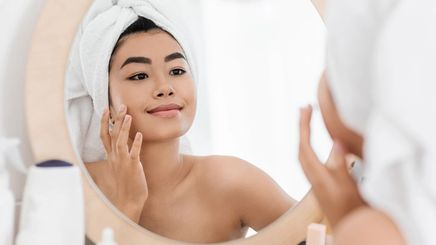
Anyone who has dealt with or is dealing with severe acne knows how debilitating it is. It may sound superficial and dramatic to hear someone say, “My acne has ruined my life,” but in many ways, it can, and it does.
The American Academy of Dermatology notes that severe acne affects more than the skin. People with acne can develop low self-esteem, depression, anxiety, poor quality of life, and feelings of isolation and loneliness. Some can be more vulnerable than others, particularly adolescent girls.
The AAD notes that early treatment is key, since leaving acne untreated can make it so much worse, as well as increase the likelihood of scarring. If you have severe acne, talk to your dermatologist for the best treatment and home care for your skin. Meanwhile, here are a few tips on how to bounce back and regain your confidence while your skin heals.
Know That Acne Is Not Forever
It’s easier said than done, but it’s important to stop obsessing if you are to . Obsessing is over-examining every comedone and pore on your face in the mirror. This can be dangerous if it leads to wanting to physically or pimples by squeezing them out, which can result in infection and deep scarring.
It’s simply not sustainable to be looking and thinking of yourself this way, especially when the fact is, acne is temporary and treatable. Shaking the habit of over-examining your skin may take a while but taking it a day at a time is enough to set you on the right path.
It might help to recite positive affirmations that are specific to your skincare journey, such as “I am not my acne” or “My skin is healthy and capable of healthy.” According to the Journal of Social Cognitive and Affective Neuroscience, this can help reduce stress, increase well-being, and move individuals to change their mindset or behavior.
Learn to Love the Skin You Have
Physical recovery from acne is two-fold. The first phase treats the skin condition with specific acne-fighting products. An acne face wash like POND'S Bright Miracle Ultimate Acne Control Facial Foam has salicylic acid and Vitamin B3+ to reduce impurities, excess oil, and accumulation of acne-causing bacteria. A cleanser such as Eskinol Deep Cleanser Classic Glow may also help control oil and prevent further blackheads and breakouts.
The second phase is strengthening the skin by recognizing that it does need help. Think of it as skin rehab, where you fortify the skin you have, especially after using acne-busting ingredients that can also be extremely drying. Beyond anti-acne products, this involves employing a gentle, non-irritating, non-comedogenic skincare routine to avoid more breakouts and to strengthen the skin barrier.
Focusing on this part of the process can completely change your relationship with your skin, from being constantly at odds with it to being its nurturing protector.
Nurture Your Skills and Talents
Having severe acne can be all-consuming. It can come to a point when it’s all you can think about, and you constantly worry about how people would react to it instead of to you. It can feel like you’re fading or disappearing and your acne is all anyone can see. This low self-esteem, according to the International Journal of Women’s Dermatology, can prevent you from coping with new challenges and even illnesses.
Recognizing your talents, skills, and passions can be a powerful form of self-acceptance, in which you focus on the positive and nurture it. Following your passions is not merely a distraction, but a meaningful journey that can bring you a renewed sense of self-worth that’s not anchored on how your skin looks.
Trust the Process
Acne is not a new thing. Acne treatments date back to ancient Greek and Egyptian times, notes the International Journal of Women’s Dermatology. With every new development in science and skincare comes a new treatment that’s just a tad better than the previous one. These days, there are several options to choose from. There are in-office laser treatments, pills and oral acne remedies, and topical products with different ingredients. Talk to your dermatologist to identify which would work best with your condition and skin type and trust the process.
Treating severe acne requires a lot of patience. Sometimes, even years of treatment won’t make all of your pimples or scars go away. Knowing that you’re doing your best to take care of your skin can in itself be an empowering and motivating experience. Just keep going and know that you’re not alone.